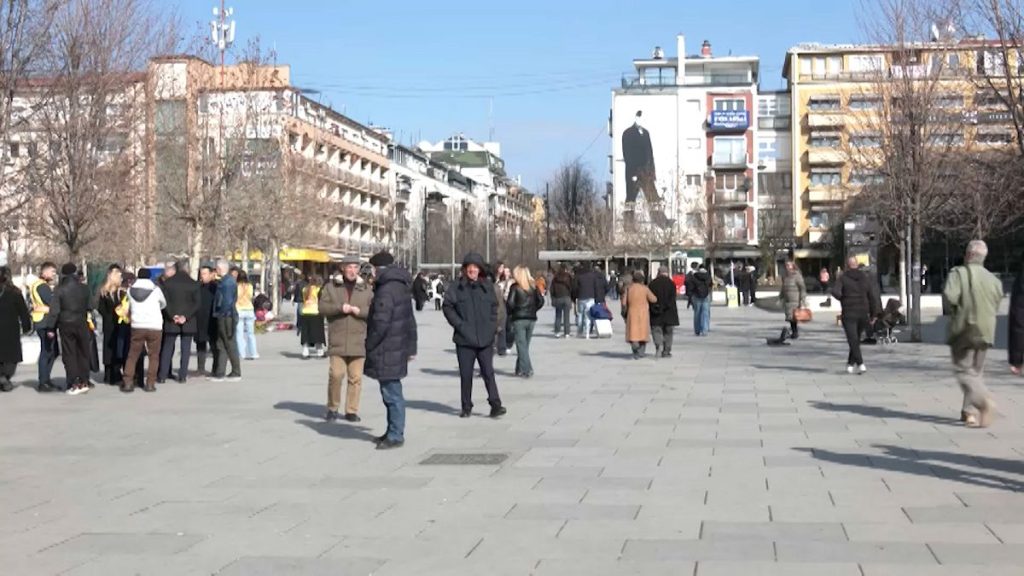Summarize this content to 2000 words in 6 paragraphs in Arabic
Whatever the result of Sunday’s election, the next government will have to tackle increasing poverty and counter the threats of renewed ethnic violence in the country’s north.
ADVERTISEMENTKosovo citizens are set to head to the polls amidst an ailing economy and reignited ethnic tensions between ethnic Albanians and Serbs – with legislative elections taking place on Sunday. Forecasts predict Prime Minister Albin Kurti could win a slim majority. Otherwise, he’ll likely need to form a coalition with his main ethnic Albanian rivals.Whatever the result, the next government will have to tackle increasing poverty to counter the ongoing threat of ethnic violence in Kosovo north, populated mainly by ethnic Serbs. A recent World Bank report has Kosovo as the European country where the poverty rate is being reduced the slowest. The prosperity gap, measuring the distance between incomes, is the highest in the Western Balkans. According to the WB report, this means that the average wages should at least triple to reach the global prosperity standard. “According to the government we have had a good economic growth in terms of the budget. This might be true,” Eraldin Fazliu, a political editor from Kohavision or KTV, a leading news outlet in Kosovo, told Euronews. “But when it comes to how people live, inflation and unemployment people have found big difficulties in the last four years.” “What (Kurti) at least at this stage has failed to do is to make people living in the north to basically embrace his policies, and this is the most difficult step,” Fazliu explained. “Because, as we know, the people living in the north of Kosovo are not only controlled by Belgrade, but their health care and their education systems are paid by Serbia.” The chairman of the Kosovo Business Association, Agim Shahini, an ethnic Albanian entrepreneur with strong connections in Washington, sees the economy and living standards — and not ethnicity — as the central wedge between the people.“In Kosovo there is not an ethnic conflict. In Kosovo the major problems is the economy that Kosovo must resolve for all the communities of Kosovo: for the Albanians, the Serbs, the Bosniaks, the Turks so to increase living their standards. The biggest problem is how to do it,” Shahini told Euronews.According to him, the previous Trump administration went in the right direction when it decided to put ethnic and political issues aside and focus on the country’s economy. ‘People are living their lives’There is also the brain drain. According to the World Bank’s Poverty and Equity brief on Kosovo, published last October, the “outmigration raises concerns about potential human capital losses.” “Young people depopulating doesn’t help the country be productive and ready to innovation that would be essential for the countries (like Kosovo) to increase the living conditions, the economic performances and the social improvement, all those factors that give positive results in terms of human development index,” said Alfonso Giordano, professor of Population, Environment and Sustainability at the Luiss University in Rome.According to Giordano, these structural problems are also difficult to fix due to the specificity of Kosovo, which, after almost three decades, still has an internationally backed administration and is still suffering from social and ethnic conflicts. The EU and international funds arrived too late when the demographic balance of the region was already compromised. ADVERTISEMENTOrdinary people struggle against inflation and a failed economy, according to Serb NGO activist Stefan Kalaba, who hails from Mitrovica. The city in Kosovo’s north, divided by the river Ibar, is often the field of ethnic tensions between the ethnic Serbs and the Albanians majority. SUVs belonging to the international security police forces, the Multinational Specialised Unit (MSU), part of the NATO-led KFOR peacekeeping mission, are easy to spot.Their presence is a sign that the ethnic conflict in Kosovo, almost 26 years after the end of the war, is far from being resolved. And the people of Kosovo are caught in a sort of eternal transition. The results of decades of unresolved conflict following Kosovo’s war of independence from Serbia is a structural economic problem pushing educated young people to migrate elsewhere in Europe. ADVERTISEMENT”On the high level, politicians in Pristina and politicians in Belgrade are pretty much stuck. But on the lower level, people are simply living their lives,” Kalaba said.”The political instability provokes a lot of stress on the market. People don’t even try to find a job in Kosovo. As soon as they finish high school, young people don’t even try to find a job here. They migrate to Germany, Switzerland and the rest of the EU,” he added.The international community has criticised Kosovo’s PM Kurti and Serbia’s President Aleksandar Vučić for not implementing the EU-brokered agreements on normalising relations between the two sides, which has resulted in further tensions. Kosovo currently depends on international donations. “Without those international donations, Kosovo will not be sustainable at all,” said the president of the Young Active Gracanica youth association, Petar Đorđević. “It’s one of the poorest economies in Europe.”ADVERTISEMENT
rewrite this title in Arabic Kosovo citizens to head to polls amid ailing economy and continued ethnic tension
مقالات ذات صلة
مال واعمال
مواضيع رائجة
النشرة البريدية
اشترك للحصول على اخر الأخبار لحظة بلحظة الى بريدك الإلكتروني.
© 2025 جلوب تايم لاين. جميع الحقوق محفوظة.


